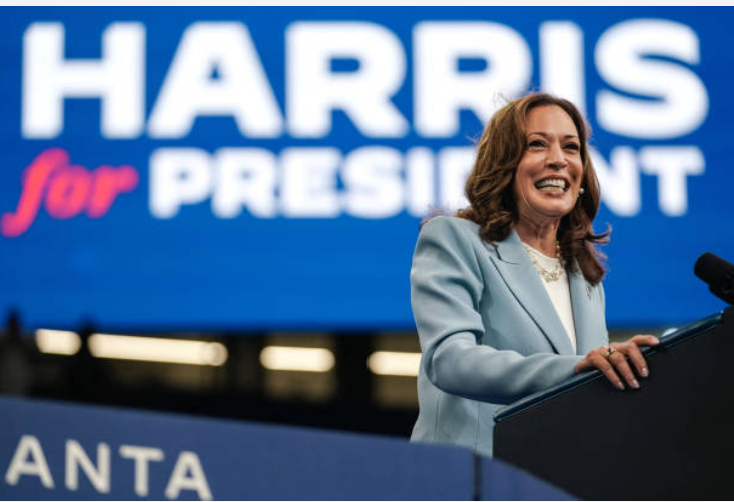A New Start: Kamala Harris’ Nomination and Its Impact on the Presidential Race
On July 11, Joe Biden made a surprising announcement by stepping down from the US Presidential race following a disastrous debate against Donald Trump. Since then, Biden has been a very public supporter of Kamala Harris, the new Democratic nominee, showing a unified front for the party. This shift has ignited a wave of enthusiasm within the Democratic ranks, with voters, supporters, and public figures all rallying behind Harris. Donors have also reopened the financial floodgates, giving the campaign a significant boost.
The Democratic Party has witnessed a quick and refreshing change in the US race. What was once predicted to be a monotonous battle between Trump and Biden has transformed into a surprising and exciting fight for the presidency. Behind Biden’s step-down lies a clear issue: the presidency has visibly tired the elder statesman, a sentiment echoed by the public. The presidency has without a doubt taken a toll on Biden, at least according to public opinion.
Moreover, even before the events of June 21, polls indicated that a “Harris vs. Trump” matchup would have better chances of success. Since her nomination as the Democratic candidate, polls have shown a rapid increase in Democratic intention votes. While some critics argue that this momentum might be short-lived and could wane before winter, it is still a dramatic turnaround.
The Trump Assassination Attempt
This notable shift in the race comes only a few weeks after Donald Trump survived an assassination attempt by 20-year-old Thomas Matthew Crooks on July 13. During an open-air campaign rally near Butler, Pennsylvania, Trump was slightly injured but survived the attempt on his life. This incident captured the media’s full attention, putting Trump in the spotlight.
Some argue that Biden’s decision to step down and support Harris was a strategic move to shift the media focus away from Trump’s assassination attempt. Harris’ first week as the Democratic nominee was marked by an impressive and unprecedented $200 million surge in donations in less than a week. Even more interestingly, over 70% of these donors were first-time contributors, indicating that Harris may have won over new supporters who were previously hesitant. In just a few days, Kamala Harris gained more than 170,000 new followers.
The Democrats’ Strategic Move
This shift is arguably the best move made by the Democrats in response to the momentum Trump was experiencing since the beginning of his campaign and his choice of J.D. Vance as his Vice-Presidential running mate. Initially, many Democrats feared Biden’s step down and Harris’ entry into the race. They believed it would be challenging to find a consensus on a new candidate. However, Harris has proven to be a positive catalyst, bringing a wave of freshness to the party. Even internal opposition within the Democratic Party has rallied behind her, showing official support.
Poll Shifts and Public Perception
Polls have shown significant shifts since Harris’ nomination. Within five days, the predicted outcomes went from 48% for Trump versus 44.6% for Biden to 48% for Trump versus 46.2% for Harris. Although Harris is still slightly behind, this nearly 2-point gain in such a short period is notable. The harsh criticisms aimed at Biden regarding his age have now backfired on Trump, who is now the oldest candidate in the race at 78 years old, compared to Harris’ 58 years.
Trump’s choice of J.D. Vance, who appeals primarily to white male conservative Catholics, contrasts sharply with Harris’ focus on diversity and inclusion. This strategic difference could play a crucial role in the race to the White House.
Harris’ Choice of Running Mate
Harris’ recent choice of Tim Walz, the governor of Minnesota, as her running mate is yet another strategic move. This decision, made quickly from a list that included 12 other potential candidates such as Josh Shapiro, governor of Pennsylvania, and Mark Kelly, governor of Arizona, was historic in its speed. Although Harris and Walz do not share a common history, Walz’s authenticity and appeal to voters who may have felt alienated by Trump were key factors in her decision.
The Challenges Ahead
Despite the renewed confidence among Democrats, there is no guarantee that Harris will win the 90-day race to the White House. Trump has been campaigning for months and has gained significant traction in nationwide polls. However, Harris’ nomination has injected a new sense of confidence and urgency into the Democratic campaign. In just a few weeks, she has managed to close the gap left by Biden, coming back from a 6-point deficit in the polls.
The Final Stretch
As we enter this critical period, anything can happen. Harris’ biggest challenge will be to maintain and sustain the momentum created by her nomination. Convincing voters in swing states will be crucial to securing the presidency. The last 90 days of the race promise to be intense and highly contested.
In conclusion, Joe Biden’s decision to step down from the presidential race and support Kamala Harris has dramatically altered the dynamics of the 2024 election. The Democrats have experienced a surge of enthusiasm and financial support, while polls show a tightening race. With strategic choices like Tim Walz as her running mate and a focus on diversity and inclusion, Harris has revitalized the Democratic campaign. However, the race remains highly competitive, with both candidates facing significant challenges in the final stretch. The outcome of this unprecedented election remains uncertain, but one thing is clear: Kamala Harris has brought a fresh and dynamic energy to the Democratic Party, setting the stage for a thrilling battle for the presidency.






